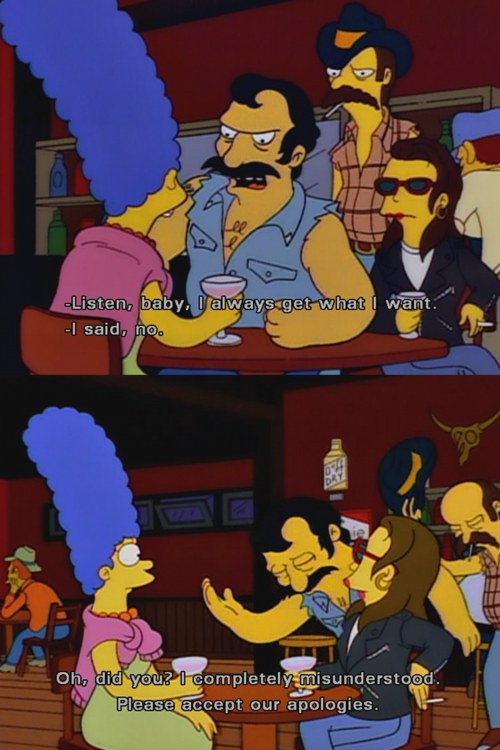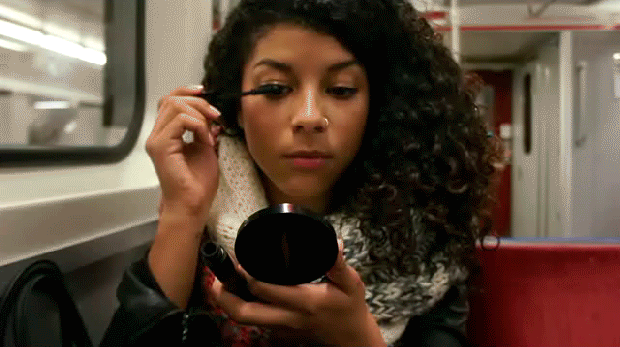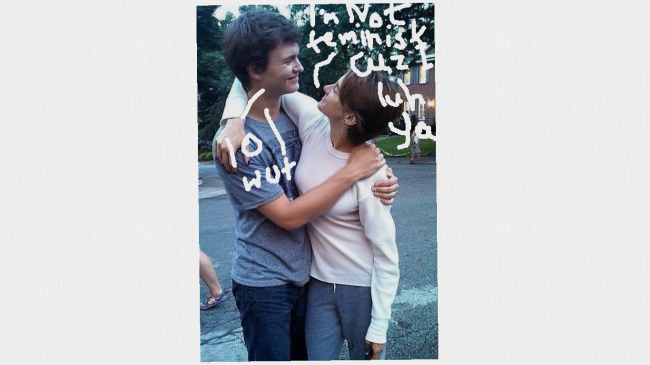
If only it were always this easy. Credit: Matt Groaning, or something
They say that there are two certainties in life: death and taxes. Ho ho ho, he he he, what a lark. The saying clearly came about before women won the right to give their opinion, because for the second sex there is of course a third certainty: creepy old men.
The creepy old man’s origins are little-known, like Ska music or lenseless glasses (both are now presumed to have risen from the embers of hell). The first image of the creepy old man was etched on tablets in Egypt at around 3100 BC. Indeed, before Anthony swept Cleopatra out of her milk bath into his arms, the creepy old man sidled up to her in a dingy pub and asked her where she got her earrings, because they really accentuated her rack.
Most women have at least one horror story about unwanted, unwarranted male attention in the form of a creep. The word “creepy” is imperative to describing this archetype. This is not an intriguing, mysterious quiet don across the bar you’re trying to telepathically compel to offer to buy you a drink. This is quite a different animal altogether. He (and make no mistake, when you’re a woman, it is always a man who creeps up) manifests himself in numerous ways. Many experiences are different. But in my own experience, the progression of creepiness is thus:
- The Sidle: For there is not a move so slimy, so sweaty, so slick with ill intent and cheap aftershave than the sidle of the Creepy Old Man. Call it survival instinct; a woman senses his approach with a chill down her spine, then a hand on the small of her back. “What’re ye drinkin’?” The entire movement is scored by Grieg’s In the Hall of the Mountain King.
- Best Friend Charade: The Creepy Old Man is not stupid: he knows that you know what he’s doing. So he wraps his performance in a thin veneer of faux-friendship, puts his arm around you and makes out like you’re just two pals, having a laugh. His hand is too low; his breath is unbearable; you cannot understand a word he says so you just smile wanly, wishing you were anywhere else. The Creepy Old Man also puts this charade on for onlookers, possible saviours – But for some reason you have to stay – waiting for a friend, watching live music, wanting to enjoy your night. But you soon find that was a fruitless endeavour.
- Showman: He feels your patience waning, you keep telling him to leave you alone and he needs to impress. So logically, he becomes the joke of the room, pulling “hilarious” dance moves while you and everyone else pretends not to notice and looks anywhere other than his figure, desperately gyrating out of time to the music as an attempt to stir something in you.
- Sad Drunk: The end of the night, the end of your patience. You’re leaving? So soon? he slurs, as you pay your tab and grip your mobile in your pocket. He stretches out his arms, presumably for an embrace, but you’re not a colossal idiot, so you swerve past him in a series of impressive serpentine motions, towards the door, which at the moment looks like the pearly gates of heaven, that beautiful green exit sign, a path to freedom, to a beautiful emancipation.
Oftentimes, recounting the tale will result in reactions of hilarity – people will respond to the story like it’s a madcap rollercoaster tale straight out of a Carry On. Sometimes it is – sometimes the encounter makes no impression other than a two-minute interlude to your night.
But more often than not there are dark, sinister undertones to the Creepy Old Man. There is a reason why he is called the Creepy Old Man, not the Endearing Auld Scamp or the Mischievous Chancer. Sometimes he isn’t even that old; sometimes he’s the same age, but make no mistake: still just as creepy.
It’s been said before, but women have historically been raised to be polite, most especially in the face of unwanted male attention. We have been taught to react with manners, even when the man in question clearly has none. We have been told to feel flattered; as if the idea that a man should be attracted to us is some kind of great unexpected honour that we must be appropriately grateful for, no matter how inappropriate the advances are. We must treat him like a lost dog – be kind, be understanding, be careful.
There are grave issues with this idea: not only the fact that politely declining advances almost never works in swatting away this particular insect, but that it contributes to skewing a woman’s perception of her own autonomy. It suggests that women should not feel entitled to their own space. That we owe it to the Creepy Old Man to be mannerly, to be grateful. That we do not deserve to have a conversation with a friend uninterrupted. That we should deal with the situation as if it’s a compliment.
Thankfully, modern feminism has championed the power of the middle finger. Nineties feminism had its problems, but post-punk feminist bands such as Bikini Kill and Le Tigre were loud and proud about women reclaiming their space. Bikini Kill’s infamous “Girls to the Front” line pointed out the unfair treatment of women in public spaces, especially live music venues. Nowadays, women have spoken out about their experiences of sexual harassment – or even just unwanted attention – on social media, in part thanks to Laura Bates, founder of Everyday Sexism. It’s being discussed openly in a public forum. But it still persists in public places today, most likely at your local pub.
It can feel like it’s been a long battle with a hard punch still to be swung. But for now, we can swing the fist of feminism in our own life, the next time we get that chill down our spine, the next time we notice the first signs of the Creepy Old Man rearing their ugly head. In my experience, there’s only one method that’s proven 100% successful. Look him square in the eye. You’re the black panther, he’s the witless warthog. Then say it, clear-cut and unflinching, right there and then:
“Fuck off.”
Useful links:
http://www.unwomen.org/en/what-we-do/ending-violence-against-women/creating-safe-public-spaces
https://twitter.com/EverydaySexism?ref_src=twsrc%5Egoogle%7Ctwcamp%5Eserp%7Ctwgr%5Eauthor








